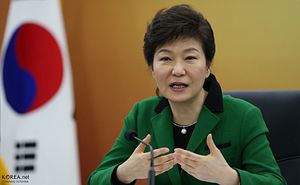In an address commemorating the 71st anniversary of the liberation of the Korean peninsula at the end of the Second World War on Monday, South Korean President Park Geun-hye defended her decision to move ahead with the deployment of a U.S. missile defense system and addressed human rights abuses in North Korea.
Park’s speech—an annual tradition by the South Korean leader on liberation day—avoided directly rebutting criticism by China over the joint U.S.-South Korea decision to deploy the Terminal High Altitude Area Defense (THAAD) system.
She additionally avoided any mention of domestic criticism of the THAAD system. The first THAAD battery in South Korea will be installed at Seongju, where residents have protested the decision.
The South Korean president, in her speech Monday, asked critics of the plan to deploy THAAD to present an alternative: “If there is another way to protect our country and people, the alternative must be presented,” she said.
As The Diplomat reported earlier this month, the decision to deploy THAAD has invited low-level economic retaliation from China, with expectations that the rift over the missile defense system may continue to grow.
China’s Foreign Ministry has strongly criticized the decision to deploy the system. Beijing “strongly urged” South Korea and the United States to refrain from moving ahead with THAAD.
Meanwhile, China’s Defense Ministry also said that it would take steps in response to the decision. “The Chinese side will consider taking necessary steps to maintain national strategic security and regional strategic balance,” it said in a statement.
In addition to THAAD, Park addressed the state of human rights in North Korea.
“We will no longer deny or turn a blind eye to the suffering of the North Korean people who are living in great hardship because of the wrong choices made by the North Korean regime,” she said.
After attempts at rekindling inter-Korean talks last year, the bilateral relationship between the two neighbors nosedived after Pyongyang’s decision to carry out a fourth nuclear test earlier this year. Notably, the Kaesong Industrial Complex was closed in February, suspending one of the few symbols of inter-Korean cooperation.
Human rights abuses in North Korea under Kim Jong-un have been detailed by the United Nations and non-governmental organizations alike. In 2014, a UN Commission of Inquiry published findings documenting systematic human rights abuses in the country, including forced labor, torture, extrajudicial killings, arrests, and more.
Park’s speech also addressed South Korea’s relationship with Japan, another important U.S. ally in Northeast Asia. The three countries have increased their intelligence-sharing and cooperation on threats emerging from North Korea.

































